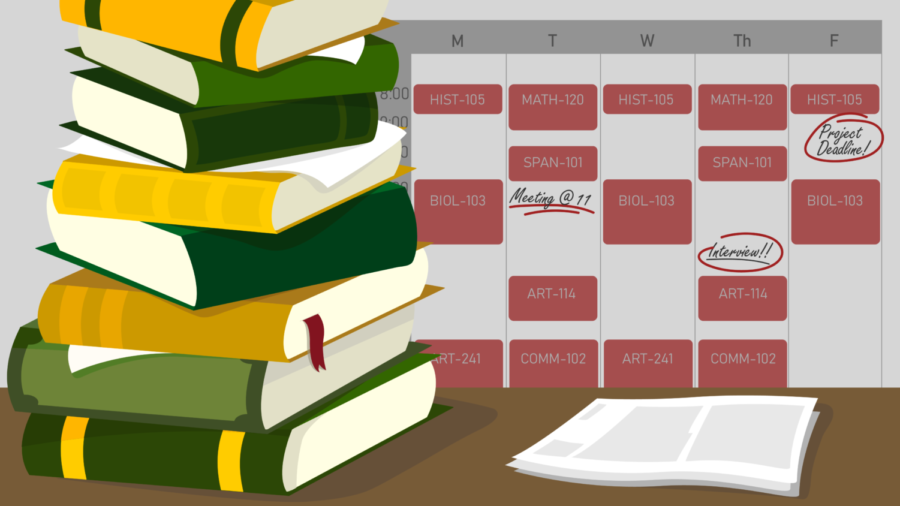How to avoid burnout as a college student
Photo credit/ Sabrina Resuta
Opinion Editor Maddie Adams gives students tips on how they can take care of themselves while in the middle of the craziness of the semester.
If you ask any college student, they probably tell you that they’ve experienced some level of burnout throughout their academic career.
A study conducted by The Ohio State University found that between 2020 and 2021, feelings of burnout among college students increased by a staggering 30%. This meant that a majority of students were feeling the effects of burnout, including anxiety, depression, and a rise in unhealthy coping mechanisms.
We are not machines. We cannot expect to be working all day every day. We need to make sure we are taking the time to care for ourselves and our mental health.
Here are some tips/things to keep in mind to help manage stress and prevent burnout:
Schedule time for yourself
Get out your planner and in between classes, sports practices, and extracurricular activities, pencil in some time just for you. Maybe plan a self-care night, work in a quick meditation practice, schedule a workout, or relax with your friends.
Sometimes as students, it can feel like we’re too busy to spend time on activities we enjoy. It’s important to remember the things that bring us joy, happiness, and relaxation and that carving out time for these things can help your overall mood and stress level.
Learn how to say no to things
College is full of amazing opportunities academically and socially, but just because there are a million things going on doesn’t mean you have to participate in all of them. Now don’t get me wrong, it’s not a good idea to say “no” to going to class (going to class is important!), but just because you were asked to join a club or a committee, doesn’t mean you have to. Take a look at everything you’re involved in, clubs, committees, jobs, etc., and prioritize the things that are important to you.
There are only so many hours in a day and some of them should be dedicated to eating, sleeping, taking care of yourself, etc. You should definitely get involved with clubs and other activities, but try not to spread yourself too thin.
Ask for help when you need it
Sometimes we are busier than we would like to be, which can be overwhelming, but there are resources on campus designed to help busy students balance all aspects of their lives. If you’re struggling in a class, a tutoring session might help. If you’re having a hard time dealing with stress, a trip to the Counseling Center might be what you need. If you’re having trouble meeting deadlines and completing assignments, try to talk with your professor and see if you can work something out together. There is absolutely no shame in asking for help when you need to.
Take breaks if you can
No one expects you to be working 24/7. We all need to make time to rest every now and then. If you have a break for lunch or dinner, try not to spend your time thinking about or working on schoolwork. Find moments throughout the day when you could take a breather, even if it’s just a few minutes. A little mental health break can go a long way. Prioritize your rest. It can be tempting to stay up late, wake up early and chug a coffee to make it through the day (and we’ve all done it!), but rest is so incredibly important, especially when we feel particularly stressed or anxious. There’s nothing a good night’s sleep can’t help with.
Be honest with yourself
Many people tend to push through feelings of stress and burnout and, unfortunately, sometimes we have to keep going even when we don’t have the energy to, but it’s important to be honest with yourself about how you’re feeling. If you’re feeling especially stressed, try not to brush it off like everything is fine. Sometimes by ignoring our feelings, we’re only putting them off until later. By addressing our feelings as they happen, we can proactively process them and prevent intense emotions and burnout in the long run.
A good way to check in with yourself is by setting aside some time, maybe at the end of the day, to reflect on the events of your day and how they made you feel. If you want to take it another step further, you can journal about it too.
Balancing school, friends, work, and life is difficult, but your health and wellness should be a priority too. We have a responsibility to care for ourselves as best as we can. When we show up for ourselves and invest time and energy into our own well-being, we can bring our best efforts to our academics and our relationships and we’ll feel better too!
Contact the writer: [email protected]

Madeline Adams is a junior multimedia communications major and is the Editor in Chief for The Wood Word. She is a DJ for Marywood's own, VMFM 91.7, and...

Sabrina Resuta is a junior graphic design major and the lead designer for the Wood Word. Sabrina is also a part of Zeta Omicron, Marywood’s art honor...














